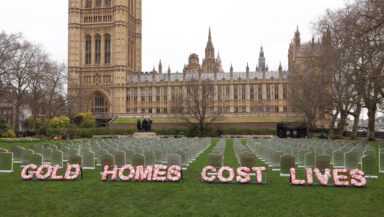Concerns over climate and nature are higher than the national average in the Blue Wall and scores of marginal seats, a major new survey of 20,000 people shows [1].
This leaves the Conservatives in danger of losing seats in key battlegrounds if the party fails to strengthen its climate commitments and continues to row back on policies needed to tackle the crisis, according to Greenpeace UK.
The detailed, constituency level polling of people across Great Britain by Survation, which factors in the new boundaries for the next General Election, shows strong support for climate and environmental policies. Of those who had an opinion, more than two thirds (70%) stated that climate and environment policies are important and will influence how they vote in the next election.
However, the results are even higher for voters in the Blue Wall – where the Conservatives are currently predicted to hold just 29 out of 52 seats – and the most marginal constituencies [2], with overwhelming support for almost all specific climate policies, and almost three in four of these constituents (72% and 71%, respectively) stating that those policies will influence how they vote.
Greenpeace UK’s climate campaigner, Georgia Whitaker, said:
“Voters in the most hotly contested seats are saying that climate change matters to them, and they want bold policies to tackle it. But in a desperate attempt to play politics with the climate, Sunak risks haemorrhaging his party’s support in Tory strongholds and key marginals. This endless flip-flopping on such vital issues will not only leave people with higher bills and a damaged economy, but it could badly backfire against Sunak’s party at the next election unless the government changes tack.”
Project Climate Vote: a nationwide door-knocking programme
The news comes as Greenpeace announces the launch of Project Climate Vote, a nationwide mass door-knocking programme, which aims to recruit at least one million Climate Voters and force UK political parties to strengthen their plans to tackle the climate, nature and cost of living crises right now, at the next election and in the years that follow.
The door-knocking campaign will see thousands of people holding conversations about climate on the doorstep, over the phone and on social media, with a focus on dozens of key marginal seats – including in the Blue Wall – from now.
Celebrity backers
28 high-profile celebrities, including Stephen Fry, Olivia Colman, Mel B, Will Poulter and Joe Lycett have all backed the campaign [3]. They have also signed an open letter addressed to all political leaders, alongside over 100,000 others, demanding stronger action on climate, stating that “we will judge you at the next election”.
The letter warns that “our country is broken,” thanks to “the failure of successive governments” but that unlocking climate solutions will help tackle other crises by lowering energy bills, cutting air pollution and boosting the economy.
Actor Peter Capaldi, who is backing the Greenpeace UK campaign, said:
“It can feel overwhelming when you look at all the crises we are facing, like the cost of living, extreme weather, and pollution choking our rivers and seas. But none of this is inevitable and, although we’re clearly already suffering the effects of extreme weather, there’s still time to change direction.
“I stand with people all over the country who are demanding climate action for our NHS, our economy and our planet. A safer, healthier future for all is within our grasp if politicians can be bold and brave enough to deliver it. It’s up to us to demand that our political leaders listen, and deliver on what the country and our children deserve.”
Public opinion in Blue Wall and marginal seats
The results of the new polling also reveal that in Blue Wall and marginal battlegrounds, more than four in five (85% in the Blue Wall, 86% in the most marginal seats) of constituents who had an opinion want the government to provide more financial support to insulate homes and almost four in five (73% for both) want more government funding for heat pumps. They also want to see more government investment for renewable power (88% and 87%) and subsidised rail travel to ensure it is always cheaper than driving (79% for both).
Four in five (80%) residents in the Blue Wall support the idea of a wealth tax on the richest 1% of people to fund action on climate change, and almost nine in 10 (87%) want to see a loophole-free windfall tax on the profits of oil and gas companies. Support for these taxes gets even more support in marginal constituencies where 82% of those who had an opinion want to see a wealth tax and 88% support a loop-hole free windfall tax on oil and gas giants.
Bellweather seats
In the 12 constituencies identified as potential bellwether or indicative seats by Greenpeace’s political analysts [4] – which include Stevenage, Chingford and Woodford Green and East Thanet (currently the seat of Craig Mackinlay, one of a vocal minority of Conservative MPs lobbying for Sunak to water down climate policies) – overall support for almost all climate and nature policies, as well as climate concern and demand for more political action on climate and the environment, was even higher than in the Blue Wall and key marginal constituencies.
Whitaker, continued:
“The next general election is a key moment to ensure the next government listens to voters’ concerns on the climate. This is why we’re rolling out a nationwide mass door-knocking programme to recruit at least one million Climate Voters. For too long politicians have served the interests of the elite, making fossil fuel giants and water companies ever richer at the expense of ordinary people and the planet. This polling proves that a majority of people in this country want more climate action, not less, so we’re not going to allow self-serving politicians to split the public and turn these vital issues into a political football. A climate majority already exists, and in the next election they will be a political force that all parties will have to reckon with.”
Setting a standard for parties’ manifestos
This widespread support for key climate policies gives weight to a suite of policy recommendations set out today by Greenpeace UK, which the campaign group will be testing all political parties’ manifestos against in the run up to the election.
In its new manifesto asks [5], Greenpeace UK is calling for the next government to prioritise:
- Fixing our energy-wasting homes, unlocking affordable renewables and making public transport cheaper for everyone;
- Boosting the economy, creating thousands of jobs and supporting communities dealing with climate impacts by channeling investment into green industries and taxing the biggest polluters more;
- Protect nature at home and abroad from sewage and plastic pollution, destructive fishing and industrial agriculture.
ENDS
Contact
Greenpeace UK Press Office:
- press.uk@greenpeace.org
- 020 7865 8255
Notes to editor
1. Survey methodology
Survation conducted this nationally representative survey of 20,205 adults living in Great Britain on behalf of Greenpeace UK on a range of climate-related issues and policies, between 18th August – 1st of September 2023.
The data was analysed using Multilevel Regression and Poststratification (MRP) modelling to estimate the percentage of respondents providing an answer to a given question in 632 GB Parliamentary Constituencies.
The 632 constituencies represent newly formed constituencies for the 2024 General Election as proposed by the independent boundary commissions for each nation.
Please contact press.uk@greenpeace.org for access to the polling data
2. Marginal constituencies
The most marginal constituencies can be defined as the 150 constituencies (new boundaries) with a winning probability of less than 75%, and a winning margin lower than 4.8% based on the voting intention model used in the survey.
3. Open letter to leaders of all UK political parties
Full list of celebrity signatories: Jessie Mei-Li, Benedict Cumberbatch, Paloma Faith, Bella Ramsey, Emma Thompson, Rose Leslie, Olivia Colman, Massive Attack, Peter Capaldi, Mark Rylance, Thom Yorke, Aisling Bea, Simon Amstell, Paapa Essiedu, Richard Curtis, Siobhan McSweeney, Mel B, Debbie Harry, Stephen Fry, Frankie Boyle, Joe Lycett, Emilia Clarke, Will Poulter, Jessie Buckley, Kwajo Tweneboa, Bimini Bon Boulash and Simon Pegg
4. Bellweather constituencies
The bellwether/indicative constituencies can be defined as seats that may be in the spotlight for analysis of voter patterns by parties and national media at the next election, or – due to being marginals with wider current majorities and a high level of overlap between old and new constituency boundaries – could give some insights into wider national trends at the next election, in particular, whether Labour might form the next government; and whether the Lib Dems may take more seats off the Conservatives. They include:
Bristol Central, Chelsea and Fulham, Chingford and Woodford Green, East Thanet, Folkestone and Hythe, Richmond Park, South Cotswolds, Stevenage, Sutton and Cheam, Uxbridge and South Ruislip, Welwyn Hatfield, Westmorland and Lonsdale



